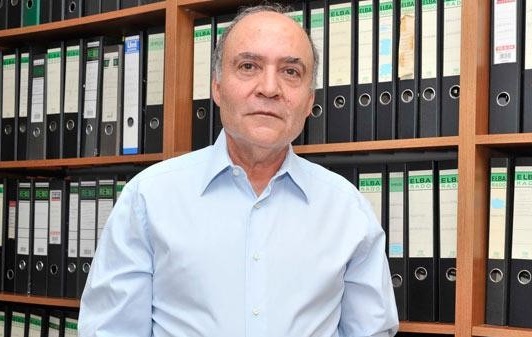
“What followed Crans Montana and is still happening is bitter for us, but we are not surprised”
25 February 2018, “HARAVGI”
Interview with Tsielepis Toumazis, member of the Political Bureau of the C.C. of AKEL, Head of the Cyprus problem Office of AKEL and International Law expert.
- With all these provocative actions by Turkey in the Cypriot Exclusive Economic Zone, do you still believe that natural gas can act as a catalyst for a solution to the Cyprus problem?
TT: We have always believed that natural gas can prove to be a blessing or a curse. It is our duty to continue, regardless of the difficulties and complications, to utilize the natural gas as a catalyst for a solution of the Cyprus problem. Besides this is the reason why we, as early as 2010 onwards, have promptly addressed this issue. For sure, the hydrocarbons issue has never been on the negotiating table for the Cyprus problem. There are, however, elements of the negotiation that have an indirect, though clear relationship with natural gas. In the discussion on the issue of federal competences, we have come to the conclusion that the EEZ should be included in them.
We also agreed that we will proceed with the issue of delimitation as provided for in the UN Convention on the Law of the Sea. Furthermore, the natural resources will also come under federal competences. On the chapter of the Economy we agreed on the way federal revenues would be shared between the centre and the constituent states. These convergences, which the UN Secretary-General also recalls in the recent report he submitted to the Security Council, essentially resolves the natural gas issue with the solution of the Cyprus problem. Thus, we were able to proceed unhindered with the first successful drilling on the “Aphrodite” block without Turkey being able to block us.
- Certain circles and forces believe that the international community’s subdued reaction to the Turkish provocations also sent out a signal that the Greek Cypriot side is also responsible for the failure of the Crans Montana talks. What’s your opinion?
TT: The Turkish provocations are flagrantly violating both the conventional and customary Law of the Sea and as such they should have been the subject of a much more resolute response on the part of the international community. Unfortunately this isn’t the case, a fact which I have to say doesn’t surprise us.
The history of the Cyprus problem since 1974 teaches that the most serious fait accompli were attempted at times where there was no negotiation procedure underway without the sole responsibility on the Turkish side being evident and recorded – not by us, but by the United Nations. Following the breakdown at Crans Montana, the UN Secretary-General in the Report he submitted basically praises Turkey for its stand and assigns responsibilities on both leaders. All that subsequently followed and continues to take place makes us feel bitter, but doesn’t surprise us. The question now is what we do from now on, given that we can only react diplomatically and that the stand of the UN, the EU and the international community in general is lukewarm.
- How can the talks resume without leaving room for the Turkish side’s extreme position for talks outside the parameters of the UN?
TT: The talks cannot resume in conditions of a crisis. The first thing that needs to be done is to defuse the crisis and immediately afterwards to begin the effort for a resumption of the talks. However, it isn’t enough to declare that we are ready to proceed to negotiations. The UN Secretary-General is not convinced that such preconditions do indeed exist, and this is clearly apparent in both of the reports he tabled after Crans Montana. We are very worried that if Mr. Guterres does not secure assurances that the two leaders are ready to proceed together to engage in a negotiating procedure with the safeguarding of the convergences agreed so far, the Guterres framework and the mechanism for implementing the solution and with the key outstanding issues in a package approach negotiation, it will very difficult to persuade him to be involved in a resumption of the negotiation process.
As far as the Turkish side is concerned, it has made many and unacceptable declarations, but if the Greek Cypriot side demonstrates a readiness to proceed in the previously-mentioned way and the Turkish side refuses to follow suit, they will be the ones who will be exposed.
In conclusion, the exploratory program 9in the Cypriot EEZ) should be continued, fully aware that so long as the Cyprus problem remains unresolved, and indeed without Turkish intransigence being recorded, we will continuously be confronted with obstacles and an escalation of the provocations on the part of Turkey.
As regards those forces and circles who say that if we proceed now with the Cyprus problem, Turkey will impose its own terms, we remind them that the negotiation will not start from scratch, but with the safeguarding of the acquis of the talks which includes the abolition of the guarantees and intervention rights, with the guarantor powers assuming only a consultative role during the implementation period of the solution, the return of Morphou and much more.




